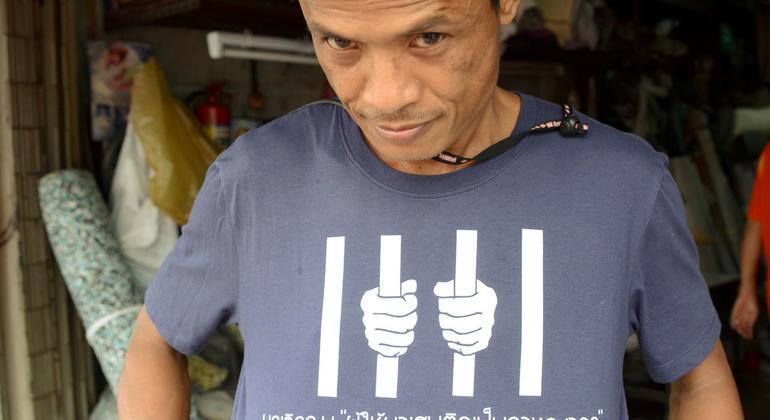HIV is a ‘serious health concern’ among people who use drugs in Thailand

Thai authorities are working alongside UN agencies to not only improve the availability of jobs following a change in the way people are sentenced for drug crimes, but also reduce the stigma of people who use drugs and ensure that they have access to jobs where they feel comfortable.
UN News spoke with the UNAIDS Country Director, Patchara Benjarattanaporn, and Karen Peters, Community Physician and Health Program Manager for the UN Office on Drugs and Crime (UNODC), about opportunities for people who use drugs to access treatment.
UNAIDS Country Director in Thailand, Patchara Benjarattanaporn.
Patchara Benjarattanaporn: New HIV infections in Thailand are on the decline, compared to 2010. However, the reduction is not nearly enough to achieve the end of AIDS by 2030, which is the commitment made by all countries under the three Sustainable Development Goals, SDG 3. Therefore, HIV is still a major health problem.
About 57,000 people in Thailand are given medicine. According to our latest research in 2020, 7.8 percent of those people are HIV infected. Another very common infection among drug users is hepatitis C, which affects the liver. Some 42 percent are infected, which is important to UNAIDS.
Karen Peters, UNODC.
Karen PetersAt UNODC, one of the issues targeted is reducing the health and social consequences linked to drug use by supporting harm reduction interventions. People who inject drugs are at a higher risk of contracting HIV because of sharing needles and other risky behaviors, for example, having sex without using a condom.
Patchara BenjarattanapornResearch shows that drug users are 35 times more likely to get HIV than non-users. The prevalence is high because of these risky behaviors, yet there are other significant structural barriers to accessing treatments. An overly punitive legal system that exists before as stigma and discrimination are major factors preventing people from accessing care and services.
Karen Peters: UNODC is supporting the national harm reduction response by inviting various stakeholders, governments, civil society organizations, and UN agencies to discuss plans to implement harm reduction measures under the auspices of the new law. The Ozone Foundation, for example, which has its headquarters in the capital of Thailand, Bangkok, is a community-based group of colleagues whose main aim is to reduce the harm caused by drugs. It is founded and run by people with drug use experience, who provide advice and services in a non-judgmental, non-discriminatory environment. Customers who come to Ozone appreciate being advised by like-minded people.
A health worker at the Ozone Foundation in Bangkok, Thailand prepares a hepatitis C test.
Patchara BenjarattanapornSites like Ozone help reduce the stigma that people who use drugs face and encourage them to seek treatment. A major reform of Thailand’s health system has also played an important role. Universal health coverage (UHC) was implemented in Thailand in 2002 and has paved the way for comprehensive care, including essential services such as HIV testing, pre-exposure prophylaxis, or PrEP, treatment referrals, and screening and treatment for sexually transmitted infections (STIs) and hepatitis C.
There is still much work to be done; A small percentage of people who inject drugs are enrolled in antiretroviral therapy, or ART, which is used to treat HIV. In the general population, around 90 percent of people with HIV receive ART, but it is below 50 percent among drug-resistant people.
Karen Peters: The new narcotics law enacted in December 2021 has also changed history in a positive way around people who use drugs. Historically, Thailand has had very severe punishment laws which punish drug offenders. The new law provides for differential sentencing on drug crimes and alternatives to prison for certain crimes. For the first time, it seems that the health and well-being of people who use drugs are being considered.
Patchara Benjarattanaporn: We are working on HIV prevention across many UN agencies in Thailand, especially UNAIDS, UNODC, UN Development Program (UNDP) and World Health Organization (WHO). We are targeting these important groups, the hidden population, by promoting community-led services, which must be delivered close to the people who need them in a situation where clients do not feel stigmatized. Integrating hepatitis C and HIV testing together as part of the care package under UHC encourages more people to get tested. This integrated approach can also include harm reduction activities.
Osone Foundation offers several harm reduction measures to prevent the spread of HIV.
Karen Peters: We are discussing principles and strategies for implementing community-based care. The Ministry of Public Health, the Office of the Narcotics Control Board, various civil society organizations, and international donors and technical experts all sit around the table in consultation and advice on ways in which this can go forward in a more sustainable way to have better results for the Thai people.
Patchara Benjarattanaporn: We are also focusing on supporting the Thai authorities in the national strategy to support these vulnerable groups, using state-of-the-art research and evidence-based solutions in order to contribute high impact. A multisectoral approach and social engagement is necessary to address the issue.
When the government shows a commitment to face the challenges, good things happen in terms of creating equal access to services and integration of services, and, even more, when civil society and partners like the UN have a voice at the table. In this respect, Thailand can be a model for the region.
SDG 3







